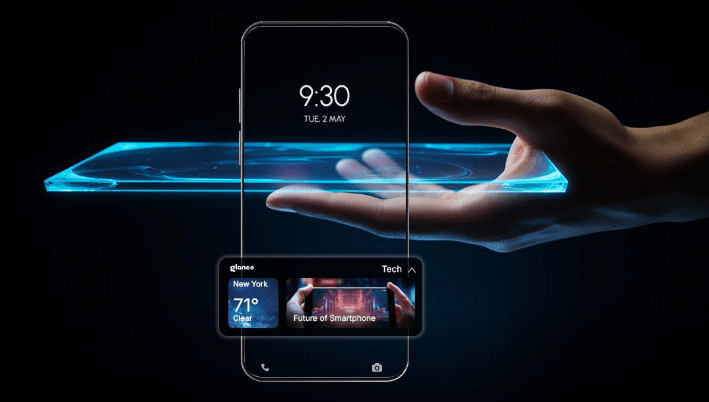The Future of Smartphones – Smartphones have become an integral part of our daily lives, constantly evolving with cutting-edge technologies. With every new update, both iPhone and Android devices introduce features that enhance user experience, security, and performance. In this article, we will explore the upcoming trends in smartphone technology and what to expect in the next iPhone and Android updates.
1. Evolution of Smartphone Displays
Higher Refresh Rates and Energy Efficiency
One of the major improvements in upcoming smartphones is display technology. Both Apple and Android manufacturers are pushing the limits with high refresh rates and energy-efficient screens.
- iPhone: Apple is expected to introduce ProMotion technology across all models, allowing for smoother scrolling and a more responsive touch experience.
- Android: Brands like Samsung and OnePlus are integrating LTPO (Low-Temperature Polycrystalline Oxide) displays, which dynamically adjust refresh rates to save battery life.
Under-Display Cameras
Under-display cameras are gaining traction, eliminating the need for notches or punch-hole cameras. This trend could revolutionize the design of future smartphones by providing a true full-screen experience.
2. Advanced Camera and AI Capabilities
Computational Photography
Smartphone cameras are improving beyond just megapixels. Computational photography is the future, enhancing image quality through AI-based processing.
- Apple: The upcoming iPhones may introduce AI-powered real-time video enhancements and improved Night Mode for better low-light photography.
- Android: Google and Samsung are focusing on AI-driven post-processing that enhances image details, removes noise, and corrects distortions automatically.
Periscope Zoom and Ultra-Wide Improvements
Android manufacturers like Samsung and Xiaomi are leading the way in periscope zoom technology. Apple is also rumored to introduce periscope lenses in future iPhones, allowing for up to 10x optical zoom without quality loss.
3. Foldable and Rollable Phones: The Next Big Thing?
Foldable phones are no longer a niche. Companies like Samsung and Huawei have paved the way, and Apple is rumored to be working on a foldable iPhone.
- Samsung: With the success of the Galaxy Z Fold series, we can expect thinner and more durable foldable displays.
- Apple: Apple’s entry into foldable technology might focus on a hybrid iPhone-iPad experience, revolutionizing multitasking.
4. The Future of Battery and Charging Technologies
Faster and Wireless Charging
Battery life is a major concern for users, and smartphone makers are working on faster and more efficient charging solutions.
- iPhone: Apple is investing in MagSafe improvements and possibly reverse wireless charging, allowing iPhones to charge AirPods and other accessories.
- Android: Companies like Xiaomi and Oppo are leading the way with 120W fast charging, enabling full charges in under 20 minutes.
Solid-State Batteries
Solid-state batteries promise higher energy density, faster charging, and longer lifespans. While they may not be available in the next generation, companies are actively developing this technology.
5. AI and Personalization Enhancements
Smarter Voice Assistants
Voice assistants like Siri and Google Assistant are becoming more intelligent with advanced AI models. Future updates may allow:
- More natural conversations
- Context-aware responses
- Integration with smart home devices
AI-Powered Personalization
AI will play a crucial role in improving smartphone usability. Expect adaptive UI adjustments, context-aware app suggestions, and AI-driven automation that makes daily tasks easier.
6. Security and Privacy Improvements
Enhanced Biometric Authentication
Security is always a priority. Upcoming advancements include:
- iPhone: Apple may introduce under-display Face ID for a seamless unlock experience.
- Android: Brands like Samsung are improving in-display fingerprint scanners with ultrasonic 3D mapping for better accuracy.
Privacy-Focused Updates
Privacy is a growing concern, and both Apple and Google are implementing more transparency features, such as:
- iOS: App Tracking Transparency (ATT) enhancements
- Android: Privacy Dashboard improvements for better data control
7. 6G Connectivity and Beyond
Faster Internet Speeds
While 5G is still rolling out globally, companies are already researching 6G connectivity, which could offer:
- 1 terabit per second speeds
- Ultra-low latency for real-time applications
Satellite Communication in Smartphones
Apple has introduced Emergency SOS via satellite, and more brands may adopt satellite connectivity for off-grid communication.
Final Words
The future of smartphones is incredibly exciting, with significant advancements in display technology, AI, camera improvements, battery innovations, and security enhancements. Whether you’re an iPhone or Android user, the next updates promise to make smartphones smarter, faster, and more secure.
Frequently Asked Questions (FAQs)
1. What is the biggest change expected in the next iPhone update?
Apple is rumored to improve battery technology, introduce AI-powered photography enhancements, and possibly launch a foldable iPhone.
2. Will Android phones get better cameras than iPhones?
Android brands like Samsung and Google are focusing heavily on computational photography and periscope zoom, which could give them an edge over iPhones.
3. Are foldable smartphones worth buying?
Foldable smartphones are getting better with improved durability and software optimization, making them a great choice for multitasking and larger displays.
4. When will 6G be available?
6G is still in early development and is expected to roll out around 2030.
5. How fast will smartphone charging get in the future?
With brands like Xiaomi and Oppo working on 240W charging, future smartphones may charge in under 10 minutes.
6. Is under-display Face ID coming to iPhones?
There are strong rumors that Apple is working on under-display Face ID for a seamless user experience.
7. What’s the next big thing after 5G?
6G connectivity and satellite communication are expected to be the next major innovations in smartphone connectivity.
8. How will AI improve smartphones?
AI will enhance cameras, optimize battery usage, provide smarter app recommendations, and improve voice assistant capabilities.
9. Will smartphones replace laptops in the future?
With advancements in foldable screens, powerful chipsets, and cloud computing, smartphones may replace some traditional laptop functions.
10. How is smartphone privacy improving?
Apple and Google are introducing better app tracking transparency, encrypted messaging improvements, and enhanced biometric security to protect user data.


